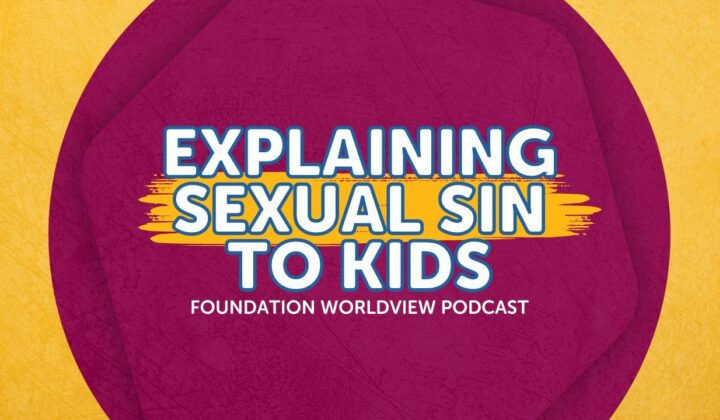Learn more about the journey that led to us equipping kids to carefully evaluate every idea they encounter.
Meet members of our team who have contributed to curriculum development.
Hear from real users of the Foundation Curriculum.
Learn what we believe about God, Jesus, Scripture, and more.
How to Teach Sexual Purity Without Inducing Shame
How can we teach children about sexual purity in a way that avoids shame and guilt? In this episode, Elizabeth Urbanowicz explores how to reframe the conversation from "sexual purity" to "sexual faithfulness," emphasizing God’s grace, truth, and redemption. Learn how to root this teaching in the gospel, guide your kids through confession and repentance, and help them understand the seriousness of sin without losing sight of God’s grace.
Transcript
Note: The following is an auto-transcript of the podcast recording.
Hello friends. Today's question says, "how do I introduce the concept of sexual purity without making my children feel shame or guilt?" This is a really important question, especially in this time when so many people who are either claiming the name of Christ or who are no longer claiming the name of Christ are just having so much backlash on what was labeled purity culture from the nineties and early two thousands. So we want to think about how can we introduce this concept of sexual purity to our children without making them feel shame or guilt? And so that's what we're going to dive down deep into today on the Foundation Worldview Podcast where we seek to answer your questions so that you can equip the children that God has placed in your care to carefully evaluate every idea they encounter and understand the truth of the biblical worldview. I'm your host, Elizabeth Urbanowicz, and I'm thrilled that you've joined me today for this episode.
Now, I think that as we're thinking through this question, we actually need to really reframe our own thoughts here as we're thinking through this concept of sexual purity. As I was just writing notes for this podcast and thinking through this question, I was thinking of my own life, and those of you who are faithful Foundation Worldview listeners, you know that I'm single. I'm not married, I'm in my late thirties and many within the church would consider me sexually pure in that I'm not married. I've never been married, I have never been sexually active. In fact, with the different guys that I've dated throughout my twenties and thirties, I've never even let any of them kiss me. So many people would look at my life within the church and say, oh my goodness, Elizabeth, you are sexually pure. But the truth is there is no such thing as sexual purity on our own merit that none of us is pure before God. This is clear in Scripture and two passages that directly speak to this. The first one is Romans chapter three, verses 10 through 12, which reads, "None is righteous, no, not one; no one understands; no one seeks for God. All have turned aside; together they have become worthless; no one does good, not even one." That there is no human who is righteous on their own merit. There is none of us who is pure, whether we're thinking about sexual purity or just moral purity in general. Then in Psalm 51, verse three through five, David writes, "For I know my transgressions, and my sin is always before me. Against you, you only, have I sinned and done what is evil in your sight; so you are right in your verdict and justified when you judge. Surely I was sinful at birth, sinful from the time my mother conceived me." And this passage makes clear that when we sin, we have sinned against God. And not only do we actively sin against him, but we have been sinful from birth, sinful from conception because we have inherited the sin of Adam. So none of us is pure on our own merit.
Scripture also makes clear that it is Jesus who makes us righteous before God. It is Jesus's life, death and resurrection that have purchased his righteousness for us. Second Corinthians chapter five, verse 21 reads, "For our sake he made him to be sin who knew no sin, so that in him we might become the righteousness of God." That Jesus knew no sin because Jesus is God, but he became sin for us so that we might have his righteousness and we might become righteous before God.
So we do not enter this world neutral. We don't enter this world as blank slates that we enter this world as image bearers of the holy God who have been corrupted through and through by sin. And this means that we cannot be sexually pure outside of the righteousness purchased for us by the precious blood of Jesus. So we need to reframe the way that we're thinking about this. And rather than thinking about sexual purity, I think we need to reframe it as sexual faithfulness, which sexual faithfulness would be striving to obey God's commands by relying on his grace to fulfill those commands, and then turning to God for forgiveness when we fail to follow his rules perfectly. So I'll say that one more time, that we need to change this mindset from sexual purity to sexual faithfulness. And sexual faithfulness, I would argue, is striving to obey God's commands by relying on his grace to fulfill those commands and then turning to him for forgiveness when we fail to perfectly follow his commands.
Now, when we approach the conversation on these foundations of truth, we are being faithful to Scripture and what Scripture teaches, we're being honest with our children and we're also not inducing shame that yes, when we sin, there is guilt involved and our world is constantly trying to figure out how to get rid of the guilt in every way, but through confession and repentance and turning to Jesus, our world is all about shouting your sexual sin and celebrating your sexual sin and reveling in your sexual sin and exploring your sexual sin where that's not the way to get rid of the guilt. The way to get rid of the guilt is to confess and repent of our sin and turn to Jesus. And so we want to be honest with our children about what the Bible says about the problem and the remedy.
Now, for those of you who have taken your children through our God's Good Design curriculum here at Foundation Worldview, the way that we introduce these concepts is through four different truths that we introduce throughout the curriculum. And the first truth that we introduce, well, it's not the first truth in the curriculum, but the first truth related to sin, is that sin corrupts God's good design. And we talk about how corrupts is a fancy word that means to ruin or destroy. And we talk about how because Adam and Eve chose to rebel against God, we have inherited their sin. So we are born sinful. And so God's good design is corrupted through a sin. But then immediately following that, the next truth that we teach the children is that Jesus defeated the power and the punishment of sin. And we talk about how through his perfect life, death and resurrection, Jesus defeated the power that sin has over us, that now those who have turned from their sin and trusted in Jesus, that they are empowered by the Holy Spirit to follow God's perfect law. And Jesus has also defeated the punishment for sin that those who have turned from their sin and trusted in Jesus now are no longer going to spend eternity separated from God in hell, that Jesus has defeated the punishment of sin. Then another truth that we cover is that because of sin, we often reject or ignore God's good design. And so we talk about how even as Christians, we are going to be tempted to reject God's good design or to ignore it, and we're also going to see many people in our world rejecting and ignoring God's good design. And when we do reject or ignore it, that the proper response is to confess and repent of that sin, to receive Jesus's forgiveness, and then by the power of the Holy Spirit to walk forward in obedience. And then the truth that we close the entire curriculum with is the truth that when Jesus returns, God's good design for us will last forever. That this right here and now on earth is not the end of the story. In fact, this right here and now on Earth is just a short, tiny little section of all eternity, that when Jesus returns, he's going to get rid of sin and death forever. And if we have turned from our sin and trusted in, Jesus will live in the new heaven and new earth. And so we want our children to understand these truths so that they understand that we are all going to struggle with sin, but we need to turn to God to receive his forgiveness, to receive his grace, and to receive the power of the Holy Spirit to walk forward in faithfulness.
And so we must model and walk our kids through the process of confession and repentance so that this becomes a way of life because our kids are going to sin. I opened up this podcast by explaining that many within the Christian community would consider me as a 38-year-old single woman as someone who is sexually pure. However, I am not pure before God on my own merit. It's only through the righteousness of Jesus. And so we want our kids to understand that they are going to struggle with sin every day, and with the proper response when we sin is confession and repentance turning to Jesus. And so we want this just to become a way of life in our households, that we are continually confessing and repenting when we sin, that our children are confessing and repenting when they sin. And so that this way they understand that it's only because of the goodness of God that we can be pure, that we can be righteous before God, and our proper response to sin is confession and repentance.
Now, we don't want this to just focus on hyper grace without taking seriously sin and sins consequences that when we sin, we are sinning against the God of the universe. So we do need to build this foundation of grace, this foundation of the gospel because that's what the gospel is, this story of God's grace in redeeming us through Jesus. And we also want our kids to understand that sin is serious, that all sin is offense against God. And we want them to understand that sexual sin does have serious consequences. So as our children grow, it will be important for us to take them to specific passages of Scripture that do talk about the seriousness of sexual sin. And a chapter that I think is important for us to cover with our children is Ephesians chapter five, specifically verses three through six, and this passage reads, "But sexual immorality and all impurity or covetousness must not even be named among you, as is proper among saints. Let there be no filthiness nor foolish talk nor crude joking, which are out of place, but instead let there be thanksgiving. For you may be sure of this, that everyone who is sexually immoral or impure or who is covetous (that is, an idolater), has no inheritance in the Kingdom of Christ and God. Let no one deceive you with empty words, for because of these things the wrath of God comes upon the sons of disobedience." And so this is a passage we can take our children to, and we can ask them, what are the different sins and offenses that are listed in this passage? And we can talk about sexual immorality, impurity, covetousness, filthiness, foolish talk, crude, joking, idolatry, and then say, what is the result of these things? And according to verse six, that it's because of these things that the wrath of God is coming. And then we can talk about how this is serious, that this sin is serious, and then tie it back in with the gospel and say, okay, we are all going to be tempted with these things. What is our proper response when we are tempted with these things? Or if we fall and we sin against God in this way, what is the proper response? And the proper response is confession and repentance.
Another similar passage we can take our children to is one Corinthians chapter six, verses nine through 11, which reads, "Or do you not know that the unrighteous will not inherit the kingdom of God? Do not be deceived: neither the sexually immoral nor idolaters, nor adulterers, nor men who practice homosexuality, nor thieves, nor the greedy, nor drunkards, nor revilers, nor swindlers will inherit the kingdom of God. And such were some of you. But you were washed, you were sanctified, you were justified in the name of the Lord Jesus Christ, and by the spirit of our God." And so this, again, we can take our children to and say, okay, what sins, what offenses against God are listed here, sexual immorality, idolatry, adultery, homosexuality, stealing, greediness, drunkenness, revilers, swindling, and all of these things are things that separate us from God that this verse says that if we are consistently practicing these things and we are not living a life of confession and repentance, that these are evidence that we will not inherit that kingdom of God. But then what does this verse say? It says, and such were some of you, but you were washed, you were sanctified, you were justified. And so through Jesus, we can have forgiveness and redemption that when we're tempted with these things or when we actually fall into these sins, that the proper response, the response of a Christian is confession and repentance. And so I think when we reframe the conversation from one of sexual purity to one of sexual faithfulness of being faithful to God's commands because of who he is and what he has done for us, then taking seriously just that sexual sin is an offense against God, that it separates us from God, but the Christian's proper response is confession and repentance. That when we set up this paradigm for our children, there's a much greater chance that they're going to understand the goodness of God's design. They're going to understand their great value and worth, and their absolute and utter need for Jesus, for salvation, for redemption, and for sanctification.
Well, that's a wrap for this episode. If you found the content of this podcast beneficial, please spend the few seconds that it takes to rate and review this content that always helps us out. Just get this content to more people so we can equip more Christian adults to get their kids thinking carefully. Also, if you have a question that you would like for me to answer on a Future Foundation Worldview podcast, you can submit that by going to FoundationWorldview.com/podcast. As we leave our time together, my prayer for you is that no matter the situation in which you and the children God has placed in your care, find yourselves that you would trust that God is working all things together for your good by using all things to conform you more into the image of His Son.
Related Posts and insights

Sexuality and God's Good Design
In this episode, Elizabeth Urbanowicz answers the question, "how would you explain to kids that homosexuality and transgenderism are not what God designed? It is so counter-cultural and our kids are going to be labeled haters as time goes on if they have a biblical worldview."

Sex as a Good Gift?
Today's question says, "I've been married for 10 years and we have children ages two through five. My husband and I have been to Christian couples counseling on and off for years because of my aversion to sex. Because of this, I'm terrified to talk about sex with my kids. How can I pass on that it's a good gift from God when I don't feel that way?"

Explaining Sexual Sin To Kids
Today's question says, "Many of our family members are living together before they get married. My children three, four, and five are beginning to ask questions about why their uncle lives with his fiance and why their cousin was at her parents' wedding. How do I walk through this without making our family feel unloved?"




